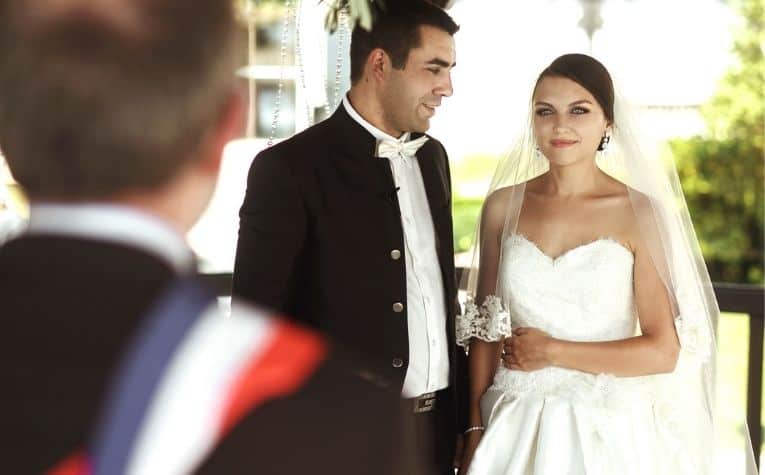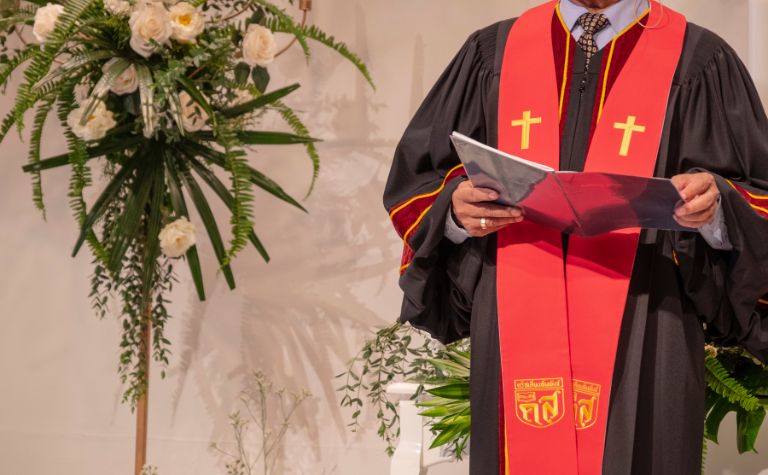Martin Luther, and the Lutheran tradition he established, triggered the Protestant Reformation in 16th-century Europe when he challenged many of the Catholic church’s teachings. Among the profound, fundamental shifts in Christian doctrine that Luther advocated was a controversial position on the issue of clerical marriage.
The Lutheran view of marriage, as it relates to clergy, is the same as its position on matrimony for all people:
- It is necessary for procreation.
- It is a God-appointed institution for the avoidance of sin.
- It is a morally-acceptable means of satisfying sexual urges for married persons.
These views were an affront to the Catholic Church and prevailing sentiment throughout Europe, leading to the Reformation. Keep reading to learn more.
Also, see Lutheran vs. Evangelical: What’s the Difference? to learn more.

The Lutheran View of Marriage and Clergy
In the period leading up to the Reformation, the institution of marriage had lost favor with religious leaders and the general populace.
People saw marriage as the path chosen by those too morally weak to take the high road and abstain from prurient activities. Martin Luther changed all that.
What is the Augsburg Confession?
One of the essential documents in the eyes of Lutherans worldwide is known as the Augsburg Confession. Its presentation before the Diet of Augsburg on June 25, 1530, is widely considered the moment when Lutheranism came into being. (Also see Do Lutherans Believe You Can Lose Your Salvation?)
The document’s author was Luther’s closest confidante, Philipp Melanchthon, and a prominent group of German political leaders signed it.
The Catholic Church had excommunicated Luther, branded him a heretic and an insurrectionist, and forced him into hiding to escape persecution. He was thus unable to travel to Augsburg with his friends.
The Augsburg Confession was a proclamation by supporters of Luther (from whose name the Lutheran faith gets its name) of the growing community’s theological beliefs in Germany. (Also see Do Lutherans Believe in Angels?)
It consists of 28 articles, each addressing a particular aspect of Lutheran doctrine. Regarding clerical marriage, Article XXIII (The Marriage of Priests) is absolute. [1]
The Augsburg Confession on marriage
Luther and his followers held strong beliefs concerning marriage and clergy. Article XXIII of the Augsburg Confession argued that priests should be permitted to marry and that this stance represented God’s will.
In support of their arguments, the first Lutherans pointed to relevant Bible passages, including the Apostle Paul and Jesus Christ’s teachings. (Also see Do Lutherans Believe in Predestination?)
Here are some of the highlights of Article XXIII justifying clerical marriage in the 16th century:
- One reason God created man was for man to procreate and produce future generations; to fulfill this requires that men and women marry and have offspring.
- Because “sexual immorality” is a part of human nature and only a select few can suppress its urges, marriage is a necessary convention for people (including priests) to satisfy their sexual needs with their spouses rather than “fall into the fire by their lusts” (Also see Can Lutherans Marry Non-Lutherans?)
- The Bible teaches that not all men are fit or capable of leading a “single life” (to be unmarried meant to be single, and thereby, celibate) and that “it is better to marry than to burn.”
- Over time, humankind grows spiritually weaker, and prudence dictates that clergy be allowed to marry to “guard that no more vices steal into Germany.”
- Far be it for man to question or defy the clear mandate of God establishing that marriage is the only suitable alternative to leading a single (celibate) life.
- In ancient times and up to the 12th century, the Catholic church permitted priests in Germany to marry and have families (Martin Luther and his early followers were German).
- As a matter of practicality, there will be a shortage of priests and pastors if the prohibition against clerical marriages continues. (Also see Do Lutheran Clergy Wear Collars?)
In essence, the basis of the Lutheran position favoring clerical marriage is an open acknowledgment that because humankind is morally flawed and only a select few possess the inner strength to live a life of complete celibacy, the only viable solution (and one ordained by God, Himself) is to marry. And priests are no exception. [2]

Martin Luther Championed (Clerical) Marriage
The German reformer Martin Luther was the founding father of the Lutheran faith and one of the Reformation’s driving forces in Europe during the 16th century.
But in the eyes of many, Luther is also seen as a champion for the institution of marriage, not just within the scope of advocating that priests be allowed to marry, but by restoring the long-lost esteem of matrimony.
Luther rejected the long-held notion that celibacy was a spiritually superior life choice to marriage and that matrimony was the option selected by those morally and temperamentally unfit for the “single life.” Instead, he espoused the beliefs that marriage:
- As with so many pre-Reformation Christian conventions and practices, marriage had fallen into a state of disrepair thanks to corruption, disorganization, and conflict within the Catholic Church.
- The concept of marriage as a union between two loving spouses and the foundation for families is a noble one deserving of respect and reverence in the Christian doctrine.
- Should be entered into primarily for procreation, but moral fidelity and sexual well-being are also best served through the institution of marriage.
- Involving underage participants should not be allowed without thorough preparation and the counsel and approval of their parents (broken marriages between underage spouses were a severe problem leading up to the Reformation).
- As long as humankind dwells on earth, marriage is a God-ordained necessity without which the human race cannot continue. [3]
Martin Luther Was In a Controversial Marriage
Luther’s passion when preaching on marriage was on full display each time he spoke of it at the pulpit.
His controversial position on marriage formed in 1525, five years before the Diet of Augsburg, when Luther, a former Augustinian monk, married Katharina von Bora, a disavowed nun. According to some sources, she had fled from her convent (in a barrel). (Also see Lutheran vs. Episcopalian: What’s the Difference?)
In transitioning from a life of celibacy as a monk to an icon in the field of theology who was married with children, Luther did not only preach about matrimony; he participated in it.
In so doing, he became its most vocal and influential advocate. In the eyes of many Christians, Luther single-handedly restored the concept of the family structure to a position of respect and esteem. [4] (Also see Lutheran vs. Non-Denominational: What’s the Difference?)

Christian Views On Marriage Leading Up to the Reformation
During the Middle Ages, monasteries sprouted throughout Europe, and many people saw celibacy as the lifestyle choice to which all people (especially clergy) should aspire.
However, even having taken vows of abstinence, stories of monks and nuns engaging in sexual affairs and even having children together were commonplace. (Also see Do Lutherans Pray for the Dead?)
Although on a lesser spiritual and moral plane than celibacy, or even virginity, marriage came to be recognized for three essential positives from a religious standpoint:
- The creation of offspring
- The encouragement of faithfulness and virtue
- The upholding of a union ordained by God
These ideals would form the backbone of Luther’s contentions and the foundation for Article XXIII of the Augsburg Confession, professing support for clerical marriage. [5] (Also see Do Lutherans Speak in Tongues?)
Final Thoughts
Lutheran doctrine took on hotly debated social and religious issues of the Reformation and was decidedly pro-marriage for all people, including clergy members. (Also see Can a Lutheran Be a Catholic Godparent?)
References:
[1] Source
[2] Source
[3] Source
[4] Source
[5] Source
Related Questions
The Lutheran and Episcopalian traditions have profoundly impacted Protestant Christianity in Europe, the United States, and worldwide. Yet, these two branches of the Christian faith have similarities...
The Lutheran tradition is a 500-year-old branch of Protestant Christianity. Non-denominational churches are a fast-growing segment of evangelical Christianity, especially in the United States and...
